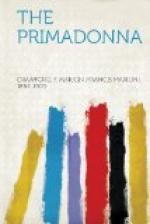Mustapha Pasha, the Turkish Ambassador, was a fair, pale man of fifty, who had spiritual features, quiet blue eyes, and a pleasant smile. His hands were delicately made and very white, but not effeminate. He had been educated partly in England, and spoke English without difficulty and almost without accent, as Logotheti did. He came forward to meet Margaret as she entered the room, and he greeted her warmly, thanking her for being so good as to come at short notice.
Logotheti was the next to take her hand, and she looked at him attentively when her eyes met his, wondering whether he, too, would think her changed. He himself was not, at all events. Mustapha Pasha, a born Musalman and a genuine Turk, never arrested attention in an English drawing-room by his appearance; but Constantino Logotheti, the Greek, was an Oriental in looks as well as in character. His beautiful eyes were almond-shaped, his lips were broad and rather flat, and the small black moustache grew upwards and away from them so as not to hide his mouth at all. He had an even olive complexion, and any judge of men would have seen at a glance that he was thoroughly sound and as strong as a professional athlete. His coat had a velvet collar; a single emerald stud, worth several thousand pounds, diffused a green refulgence round itself in the middle of his very shiny shirt front; his waistcoat was embroidered and adorned with diamond buttons, his trousers were tight, and his name, with those of three or four other European financiers, made it alternately possible or impossible for impecunious empires and kingdoms to raise money in England, France and Germany. In matters of business, in the East, the Jew fears the Greek, the Greek fears the Armenian, the Armenian fears the Persian, and the Persian fears only Allah. One reason why the Jews do not care to return to Palestine and Asia Minor is that they cannot get a living amongst Christians and Mohammedans, a plain fact which those eminent and charitable European Jews who are trying to draw their fellow-believers eastward would do well to consider. Even in Europe there are far more poor Jews than Christians realise; in Asia there are hardly any rich ones. The Venetians were too much for Shylock, and he lost his ducats and his daughter; amongst Christian Greeks, Christian Armenians, and Musalman Persians, from Constantinople to Tiflis, Teheran, Bagdad and Cairo, the poor man could not have saved sixpence a year.
This is not a mere digression, since it may serve to define Logotheti’s position in the scale of the financial forces.
Margaret took his hand and looked at him just a little longer than she had looked at Mustapha Pasha. He never wrote to her, and never took the trouble to let her know where he was; but when they met his time was hers, and when he could be with her he seemed to have no other pre-occupation in life.
‘I came over from Paris to-day,’ he said. ’When may I come and see you?’




